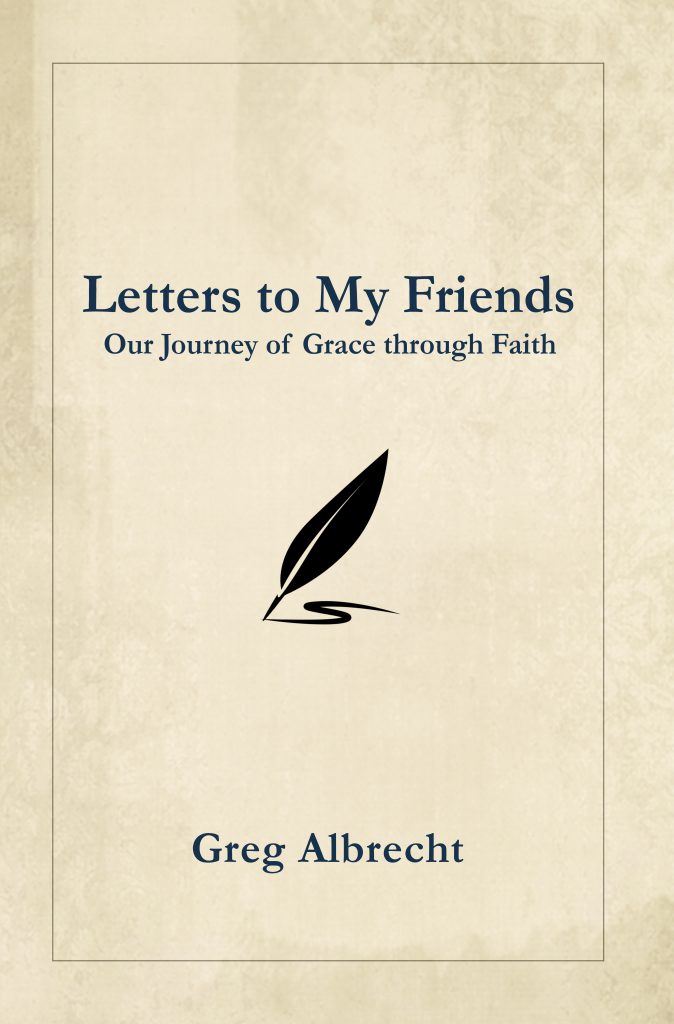Grace and Cookies – Three Lessons – by Greg Albrecht
Friend and Partner Letter from May 2016
In a “Dennis the Menace” cartoon, Dennis and his pal Joey are seen leaving next-door neighbor Mrs. Wilson’s house loaded up with a plate full of cookies. Joey says to Dennis, “I wonder what we did to deserve this?” The forever-in-trouble, always-in-hot-water Dennis, well aware that he is far from perfect, astutely advises Joey, “Look, Joey. Mrs. Wilson didn’t give us these cookies because we’re nice, but because she’s nice.”
The first lesson of grace (at least in this letter!) is this: We don’t deserve God’s love – God is not obligated to give us cookies because we think we have earned them. God loves us in spite of our behavior, not because of it. God is in control and he will not be controlled. God makes the cookies and he gives them away – we can’t buy or purchase God’s “cookies.”
The first lesson of grace is a tough pill/cookie to swallow, because we are inclined to think that God operates like we do. We prefer a predictable God who behaves in ways we think he should. By nature, humans are manipulative and deceptive, thus we attempt to shrink God down to our size in order to make him more manageable. Then, along comes religion with all of its priests, prescriptions and programs and plays on our natural dispositions, assuring us that God is within our control.
Christ-less religion reinforces our ignorance in order to more effectively control us – seducing us into forever being enamored with working harder and doing more – and the end result all of our working and doing keeps the business of religion prospering.
See how that works?
The first lesson of grace is: We don’t earn or deserve God’s love. God determines how many and what kind of cookies he will bake and how and when and to whom he will distribute them. We cannot control God’s love and grace – we cannot dictate boundaries or limitations for God and his goodness. God’s grace is what it is – God’s grace is mysterious and foreign to the way we think and operate.
As Dennis and Joey were walking back to Dennis’ house with that plateful of homemade cookies they had just been given, it probably crossed Dennis’ mind that he could tell his mother that Mrs. Wilson gave them the plate of cookies to reward Joey and him because they did some chores around her house.
But Dennis knew that 1) he never really helped Mrs. Wilson unless he was forced to and 2) his mother could read him like a book – he knew she was not about to fall for another of his big whopper-lies! No doubt Dennis tried his best to contrive some reason he should receive at least some credit for the platter of free cookies, but at the end he was forced to admit that all the credit for Mrs. Wilson’s gift of cookies must go to Mrs. Wilson – “because she’s nice.”
While Dennis and Joey had to concede the cookies were an outright gift from Mrs. Wilson (“because she is nice”), they probably convinced themselves that she was nice because they were “special” to her in a way that other kids in the neighborhood might not be. After all, they didn’t know any other kids in the neighborhood to whom Mrs. Wilson gave cookies.
Dennis and Joey might have congratulated themselves with being the only kids in the neighborhood who received Mrs. Wilson’s grace (“cookies”).
But then, just as they were enjoying the thought of how special they were (a thought almost as delightful as the taste of the cookies!), Mrs. Wilson emerged from her house with another batch of cookies fresh out of her oven. Of all things, she proceeded to take those cookies and walk right across the street to the house where the neighborhood kids lived – the ones with whom Joey and Dennis were always fighting.
Dennis and Joey were now faced with another tough pill to swallow! “Because she was nice,” Mrs. Wilson was taking those low-down, good-for-nothing kids across the street some of her cookies.
The first lesson of grace is not easy to swallow – we are given delicious, free cookies – but try as we might, we can’t honestly imagine any reason why we deserve them. The first lesson of grace is difficult because we have to admit that we only get cookies (grace) because God is nice. But, as difficult as that fact is to accept, we still get delicious, free cookies! And who doesn’t like cookies? And at least, while we’re enjoying God’s delicious free gift, we can congratulate ourselves that other people don’t seem to have cookies like we do. BUT…
Along comes the second lesson of grace: 2) God does not accept the boundaries humans draw for him. God does not stay within the lines that Christ-less religion draws for him. God loves as he determines, he does not ask us for permission before sending the riches of his grace to whomever he wishes, whenever he wishes. God is beyond our control.
Don’t you hate it when your mouth is stuffed full with God’s grace-cookies, and while you are munching away, savoring his grace, thinking how much more God loves you than other “unsaved/lost/worldly” people, in full view of where you are standing, God marches right across the street with another huge plate of cookies and gives them to those nasty neighborhood kids? Doesn’t God know that those kids across the street are really mean? God seems completely clueless – his cookie distribution methods will never work! Doesn’t he know he can’t just give away cookies to anyone and everyone??!!
“I’m not so worried about God loving me less. It is the prospect of God loving the other person I just can’t stand, just as much as God might love me.” – Barbara Brown Taylor, professor, author, theologian and one of America’s most celebrated preachers.
- The second lesson of grace lays waste to the idea that even though we don’t deserve God’s grace/free cookies and even though we only receive God’s grace/free cookies “because God is nice” – at least he gives us cookies that others don’t receive.
- The second lesson of grace destroys any pride we have about receiving God’s grace/free cookies while looking down our noses at others who do not…sorry, sad, ungrateful, self-centered people whom religion teaches us to condemn as “un-saved” and “lost.”
- The second lesson of grace is: no one has the exclusive right to franchise God and represent him. We may either receive or refuse God’s grace, but we cannot hoard it, bury it or build a fence around it.
- The second lesson of grace is that God is beyond our control. Jesus refused to respect the boundaries that religion had established between the respectable, good people and the undeserving bad people. Jesus’ continual insistence that prostitutes and embezzling crooks would enter the kingdom before the religious establishment eventually welled up into unspeakable resentment and fury that boiled over into the incredible outpouring of anger and violence that culminated in his torture and crucifixion.
And now here’s the third lesson of grace: God’s love and grace, wild and free and outside of all control and boundaries that humans might pretend to impose, produces gratitude and graciousness in the lives of Christ-followers.
- The third lesson of grace is that when God’s pure, undiluted, undiminished and “untouched by the hands of Christless religion” grace is fully embraced and received, God’s grace will transform us from miserly, self-centered individuals who wish to control God in such a way that it might appear that our little group might exclusively claim him, into inclusive Christfollowers who desire above all things that God’s grace is experienced whenever and however it can be.
- The third lesson of grace is that there are plenty of God’s grace-cookies for everyone! God’s grace motivates us to hope for a way and time in which all might be given the riches of his grace.
- The third lesson of grace is that it will cause a fundamental change in our hearts so that we are genuinely thankful that his love for you and me is not diminished by his equally incredible love for everyone! “God loves each of us as though there were only one of us.” – Augustine
In that great parable of the workers in the vineyard, we see the contrast between that which is earned (wages) and God’s grace. The workers who earned their wage were upset when the landowner determined that he would give grace to those who, in the eyes of those who deserved their own wages, didn’t earn it. “These men who were hired last worked only one hour,” they said, “and you have made them equal to us who have borne the burden of the work and the heat of the day” (Matthew 20:12).
Wages earned by effort and deeds begrudges grace given – wages earned by effort makes distinctions and separates the good guys from the bad guys – but freely given grace, without discrimination, available to everyone, seeks unity and inclusion.
“Don’t I have the right to do what I want with my own money? Or are you envious because I am generous?” – Matthew 20:15
With thanksgiving and gratitude for each and every one of you – thank you for being on the CWR/PTM team, and helping us share the incredible, inclusive grace of God – thank you for helping us distribute the cookies God is sharing with the entire world from his heavenly kitchen!
Your brother in Christ,
Greg Albrecht










 Plain Truth Ministries | Box 300 | Pasadena, CA 91129-0300
Plain Truth Ministries | Box 300 | Pasadena, CA 91129-0300

